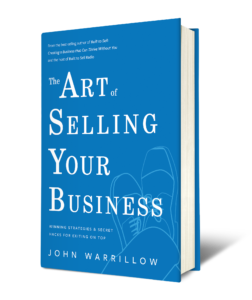

John Warrilow’s The Art of Selling Your Business

John Warrilow is the founder of The Value Builder System and accomplished author. While not a business broker himself, Warrilow has gathered considerable knowledge and expertise on the industry. His previous book Built to Sell was listed as one of the best business books of 2011. In this article, we will explore some of the key points in Warrilow’s latest book, which is entitled The Art of Selling Your Business: Winning Strategies and Secret Hacks for Exiting on Top. This book was released on January 12th, 2021 and is proving to be invaluable for business owners.
Selling When the Time is Right
One key focal point of the book is that business owners should skip trying to find the perfect “magical time” to sell their business. Additionally, Warrilow notes, “I make the strong recommendation in the book that the best time to sell your company is not during some mysterious macroeconomic environment. It is when someone is willing to buy it and you get an offer. And that is because at that point, you’re in the position of strength.”
The DIY Approach
This book reinforces the fact that business owners truly need to work with an intermediary if they are to achieve optimal results. Warrilow even includes his six reasons for why every business owner should hire a business broker or M&A advisor.
Many business owners think that they can simply handle selling their business on their own. But the simple fact is that business owners usually have no experience in selling a business. Add this to the fact that selling their business is likely to be the most important financial decision the business owner ever makes, and it quickly becomes clear that business owners are doing themselves a considerable disservice when they opt to handle everything on their own.
A Business Broker vs. a Lawyer
As Warrilow points out, oftentimes business owners think that rather than working with a business broker or M&A advisor, they can turn to a trusted lawyer who has served them in the past. But this thinking is flawed when it comes to successfully selling a business. As Warrilow states, “a lawyer, almost by default, is going to be very conservative as everything exposes a lawyer to risk. And that is why using a traditional attorney is almost always a mistake.”
If you are planning to sell your business now or in the future, a book like Warrilow’s The Art of Selling Your Business: Winning Strategies and Secret Hacks for Exiting on Top can serve as a uniquely valuable tool in your toolbox.


Copyright: Business Brokerage Press, Inc.
The post John Warrilow’s The Art of Selling Your Business appeared first on Deal Studio – Automate, accelerate and elevate your deal making.


Why Businesses Get Into Trouble


No two companies are quite alike, and this also means that there are many reasons why companies can fall into trouble. While the number of variables involved in operating a company are practically endless, there are a handful of reasons why companies can fall on hard times. Let’s take a closer look.
Lacking Focus
Companies that lack focus can often run into considerable trouble. Not understanding their customers and what they need or want can lead to endless problems. It is vital that companies frequently stop and assess who their customers are and whether or not they are properly servicing their needs.
Management Problems
Not too surprisingly, many companies can run into trouble because of poor management. Management problems are not one-dimensional, but instead take a variety of shapes. Management that isn’t focused, is incompetent, or simply doesn’t care about the business can translate into a business’s premature death.
Under the umbrella of “management problems” also falls such missteps as poor financial controls, quality control problems, operational issues, and/or not keeping up with technological advancements. At the end of the day, many of the problems on our list have at least some management issue missteps at their heart.
Loss of Key Employees or Clients
The loss of a key employee or a key client can spell serious trouble. Of course, no management team can predict every eventuality. However, when there is a loss of a key employee or client, and there is no plan for replacement, then management does shoulder at least some of the blame. The savviest companies take steps to ensure that there are ways to replace the most important employees and clients.
Failure to Compete
More than one business has been buried by the competition or failure to see a new wave of competition coming. For example, countless mom and pop video rental stores were absolutely bludgeoned by the introduction of Blockbuster Video a generation ago.
While it is true that sometimes market forces are so aligned against a business that survival is almost impossible, that is normally not the case for most businesses on a year-to-year basis. The most effective and competent management can see the competition out on the horizon. Or at bare minimum, they have an emergency plan in the event that the competition becomes more intense.
All too often by the time a business realizes that it is in trouble, it is already too late. If the problems can’t be fixed, then it may be time to consider selling the business. But such decisions must be made quickly in order to prevent additional bloodletting.
Optimally, a business is sold while it is doing well. Regardless of whether a business is thriving or experiencing difficulties, a business broker or M&A advisor can be an invaluable ally in helping a business reach its full potential.
Copyright: Business Brokerage Press, Inc.
The post Why Businesses Get Into Trouble appeared first on Deal Studio – Automate, accelerate and elevate your deal making.


Maximizing Your Time by Rating Buyer Seriousness


Your time is your most valuable commodity. The simple fact of the matter is that many “buyers” are not truly buyers. In contrast, they are often window shopping or acting out a fantasy of buying a business. In other cases, they would only plan to buy if they were to find the “deal of the century.” The last thing you want to do is waste your time trying to work out deals with people who aren’t serious or qualified buyers.
The Plus and Minus System
The best way to find a serious buyer is to use a “plus and minus” system. This system will help you weed out the window-shoppers from buyers that are truly worth your time.
First, let’s evaluate factors for which you’ll want to deduct points. If a buyer needed outside financing, then subtract 4 points. Likewise, if a buyer has been looking for 6 months or more, you’ll want to also subtract 4 points. If a buyer has no cash available, you should subtract 3 points. Additionally, if a buyer is currently working in the corporate world, you should also subtract 3 points. These are the 4 largest reasons to subtract points, but they are not the only reasons.
Below are a few reasons to subtract 2 or 1 points from a buyer’s rating.
- You learn the spouse is not supportive – Subtract 2
- Prospective buyer uses a legal pad or clipboard and takes copious notes – Subtract 2
- The buyer indicates that they are in “no rush” and want to find the perfect business – Subtract 2
- The buyer is under the age of 25 or over the age of 62 – Subtract 1
- The buyer is currently renting even though he or she has lived in the area for some time – Subtract 1
Factors to Add Points In
There are also many factors that would make a buyer fall onto the “plus” side. If the prospective buyer does not currently have a job or has just resigned from their job, then add 3 points. Likewise, if a prospective buyer acknowledges that books and records are not the only metrics by which to judge a business, add 3 points.
Add 2 points if a buyer has enough money to buy the business and another 2 points if the buyer currently has no dependents. If a close relative or family member currently owns or has owned a business in the past, then add 2 points. If the buyer is between the ages of 25 and 62 add 1 point. If he or she is a skilled worker or professional, add 1 point. Finally, if the buyer does not consider location to be a prime consideration, add 1 point.
This streamline, straightforward and relatively simple system does work. Use this system consistently, and you will quickly eliminate a large percentage of window shoppers. While no system is perfect, this “plus-minus” system for accessing prospective buyers will save you countless hours and many potential headaches.
Copyright: Business Brokerage Press, Inc.
The post Maximizing Your Time by Rating Buyer Seriousness appeared first on Deal Studio – Automate, accelerate and elevate your deal making.


Ownership Transition Survey Results on feedback and answers from family-owned businesses


Mass Mutual Life Insurance produced an ownership transition survey back about a decade ago. The survey results were based on feedback and answers from family-owned businesses. It produced some very interesting results, and is worth examining even today. While the survey at this point is quite outdated in terms of the timeline, there are still many valuable nuggets of information to be gleaned from it. Let’s dive in and take a closer look at the numbers and what they can tell us for 2021 and beyond.
While the Mass Mutual Life Insurance ownership transition survey had a range of important points, the one that leaps right off the page is the fact that a whopping 80% of family-owned businesses are still being controlled by their founders. A large percentage of those founders are Baby Boomers who will have little choice but to retire in the next few years.
The survey indicated that 55% of CEOs over the age of 61 or older have yet to choose a successor. This fact serves to emphasize the fact that a “retirement wave” will hit family-owned businesses, and this will lead to some interesting shifts and opportunities. And while the survey indicated that 13% of CEOs state they will never retire, the reality of the situation is that ownership will eventually change hands. Business brokers can expect to see an unprecedented wave of interest in their services. Additionally, prospective buyers will also have a highly unique opportunity to buy established businesses.
The survey also indicated that 30% of family-owned businesses will be changing leadership within the next five years. Of course, with that change of leadership, many possibilities open up, including the possibility of selling. However, it is important to note that while there will be a “retirement wave” amongst the Baby Boomers, not all businesses currently owned by Baby Boomers will be placed on the market.
The survey noted that 90% of businesses currently plan on remaining family-owned, and 85% of businesses plan on having their next CEO be a family member. However, it is important to keep in mind that even if these numbers were to hold true, that means at least 10% of businesses will be up for sale.
It is likely that this number is far higher now than when the survey was conducted due to the aging nature of the Baby Boomer population and owners looking to sell because of pandemic related issues. Simply stated, there will be no shortage of businesses for sale in 2021 and beyond.
Another important aspect of the survey to consider is the fact that family-owned businesses are not prepared to sell. According to the survey, 20% of family-owned businesses have not completed any form of estate planning, and 55% of family owners do not have any formal company valuation for estate tax estimates. Combine these statistics with the fact that 60% of businesses do have a written strategic plan, and it becomes clear that family-owned businesses, especially those considering selling in the future, are most definitely in need of professional assistance. Many family-owned businesses are ill prepared for the future and have a range of vulnerabilities. Business brokers and M&A advisors are uniquely positioned to provide those services.
Copyright: Business Brokerage Press, Inc.
The post Ownership Transition Survey Results on feedback and answers from family-owned businesses appeared first on Deal Studio – Automate, accelerate and elevate your deal making.


The Importance of Owner Flexibility


You shouldn’t expect to sell your company overnight. For every company that sells quickly, there are a hundred that take many months or even years to sell. Having the correct mindset and understanding of what you must do ahead of time to prepare for the sale of your company will help you avoid a range of headaches and dramatically increase your overall chances of success.
First, and arguably most importantly, you must have the right frame of mind. Flexibility is a key attribute for any business owner looking to sell his or her business. There are many variables involved in selling a business, and that means much can go wrong. An inflexible owner can even irritate prospective buyers and inadvertently sabotage what could have otherwise been a workable deal.
Be Flexible on Price
A key part of being flexible is to be ready and willing to accept a lower price. There are many reasons why business owners may fail to achieve the price they want for their business. These factors range from lack of management depth and lack of geographical distribution to an overreliance on a handful of customers or key clients. Of course, one way to address this problem is to work with a business broker or M&A advisor in advance, so that such price issues are minimized or eliminated altogether.
Be Prepared to Compromise
In the process of selling your business, you may want to achieve confidentiality and sell your business quickly and for the price you want. However, the fact is that most sellers find that it is possible to have confidentiality, speed, and the price you want, but not all three. Ultimately, you’ll have to pick two of the three variables that are most important to you.
Be Patient
A third way in which business owner flexibility can boost the chances of success is to embrace the virtue of patience. By accepting the fact that businesses can “sit on the shelf” for a considerable period of time, you are shifting your expectations. This realization can help reduce your stress level. The fact is that stressed out owners are far more likely to make mistakes.
Sometimes Losing is Really Winning
A fourth way in which business owners should be flexible is realizing that you and your lawyer will not win every single fight. There will be many points of contention, and a smart dealmaker realizes that it is often better to have a good deal than a perfect deal. You may have to make sacrifices in order to sell your company. Simply stated, you shouldn’t expect the other side to lose every point.
At the end of the day, a savvy business owner is one that never loses sight of the final goal. Your goal is to sell your business. Seeing the situation from the buyer’s perspective will help you make better decisions on how you present your business and interact with prospective buyers. Maintaining a flexible attitude with prospective buyers helps to position you as a reasonable person who wants to make a deal. Goodwill can go a long way when obstacles do arise.
Copyright: Business Brokerage Press, Inc.
The post The Importance of Owner Flexibility appeared first on Deal Studio – Automate, accelerate and elevate your deal making.
